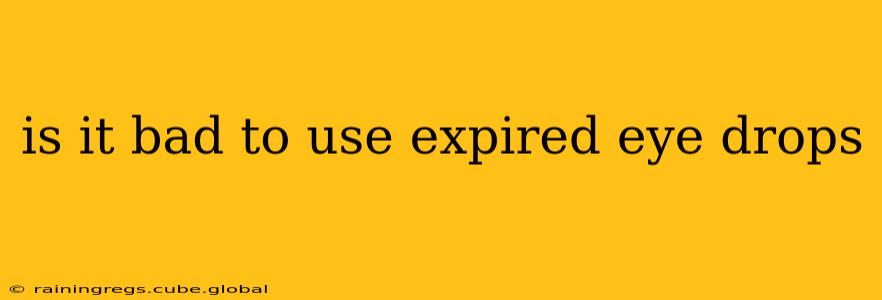Is It Bad to Use Expired Eye Drops?
Using expired eye drops is generally a bad idea, and potentially harmful. While the severity of consequences varies depending on the type of eye drops and how long they've been past their expiration date, it's best to err on the side of caution and discard them once they expire.
Here's a breakdown of why using expired eye drops is risky, addressing some common concerns:
What Happens When Eye Drops Expire?
Eye drops, like other medications, degrade over time. The active ingredients lose their potency, meaning they may become less effective at treating your eye condition. More importantly, expired eye drops can become contaminated with bacteria or fungi, leading to a range of potential problems. The preservatives designed to protect the solution from microbial growth may also lose their effectiveness, further increasing the risk of infection.
Can Expired Eye Drops Cause Infection?
Yes, absolutely. This is the biggest risk associated with using expired eye drops. Contaminated eye drops can introduce bacteria or fungi directly into your eye, potentially causing infections like conjunctivitis (pink eye), keratitis (corneal infection), or even more serious infections that could lead to vision impairment. These infections can be painful, require treatment with antibiotics or other medications, and may leave lasting damage if not addressed promptly.
How Long Are Eye Drops Good For After Opening?
The expiration date on the eye drop bottle refers to the unopened bottle. Once opened, many eye drops have a shorter shelf life, typically ranging from 2 to 4 weeks. Always check the instructions on your specific eye drop bottle for the recommended duration after opening. Discard the bottle once this shorter timeframe has passed, regardless of whether the expiration date on the bottle is still in the future.
What Are the Symptoms of an Eye Infection from Expired Eye Drops?
Symptoms of an eye infection resulting from contaminated eye drops might include:
- Redness and swelling: Your eye may appear noticeably red and inflamed.
- Itching and burning: You might experience intense itching and burning sensations in your affected eye.
- Pain: Eye pain can range from mild discomfort to severe throbbing.
- Excessive tearing: Watery or mucous-like discharge may increase.
- Blurred vision: Your vision might be temporarily impaired.
- Sensitivity to light (photophobia): Light might feel uncomfortable or painful.
- Pus or discharge: A yellow or green discharge may indicate a serious infection.
If you experience any of these symptoms after using eye drops, seek immediate medical attention from an ophthalmologist or other eye care professional.
What Should I Do With Expired Eye Drops?
Never flush expired eye drops down the toilet. Instead, check with your local waste disposal authority for guidelines on properly disposing of expired medications. Many pharmacies also offer medication take-back programs where you can safely dispose of unwanted or expired medications.
Are Some Expired Eye Drops Safer Than Others?
While some eye drops might appear to be unaffected visually even after their expiration date, there's no way to guarantee the absence of bacterial contamination or degradation of active ingredients. It's crucial to avoid any risk by discarding them promptly. Even if you only have a few drops remaining, it’s better to use a fresh bottle.
In conclusion, the potential risks associated with using expired eye drops far outweigh any potential benefits. Always adhere to the expiration dates and discard expired eye drops responsibly to protect your eye health. If you have any concerns about your eye health or the use of eye drops, consult with an ophthalmologist or optometrist.
